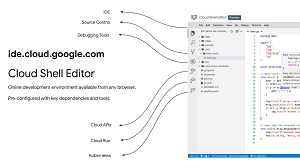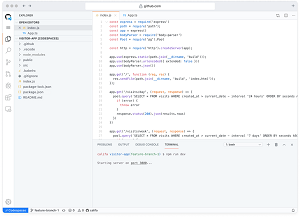News
Google Updates Editor for Cloud Shell, Alternative to .NET-Centric GitHub Codespaces
Google updated its Cloud Shell online development and operations environment that has been characterized as an alternative to GiHub Codespaces, which also provides cloud-hosted dev environments with a focus on Visual Studio and Visual Studio Code developers.
Google's update sees a new Cloud Shell Editor now available as a preview offering as part of Cloud Shell, which Google says helps developers manage infrastructure and create applications from any browser.
In that scheme, the online Cloud Shell Editor is used to develop, build, debug and deploy cloud-native apps. While GitHub Codespaces (formerly Visual Studio Codespaces) can be used via the VS Code editor (based on Atom), Cloud Shell Editor is based on the Eclipse Theia open source project, which the Eclipse Foundation has described as a "true open source alternative to VS Code."
 [Click on image for larger view.] Google Cloud Shell Editor (source: Google).
[Click on image for larger view.] Google Cloud Shell Editor (source: Google).
 [Click on image for larger view.] GitHub Codespaces (source: GitHub).
[Click on image for larger view.] GitHub Codespaces (source: GitHub).
And, much like Theia has been characterized as an alternative to VS Code, industry sources have positioned Cloud Shell as an alternative to Codespaces.
For example, product ranking site Slant published a comparison of Google Cloud Shell and GitHub Codespaces in which it says "the Slant community recommends GitHub Codespaces for most people. In the question 'What are the best cloud IDEs?' GitHub Codespaces is ranked 12th while Google Cloud Shell is ranked 16th. The most important reason people chose GitHub Codespaces is: 'Your Visual Studio local preferences and extensions are saved within GitHub, allowing you to use your configurations on the go.'"
And that isn't the only such comparison, as a Hacker News reader, commenting on the announcement of GigHub Codespaces earlier this year, asked, "Isn't this what google cloud shell + editor already does?"
Bolstering the Cloud Shell/Codespaces comparison is programming language support for .NET coders. While Codespaces obviously caters to the .NET crowd, Cloud Shell, in addition to supporting Go, Java, Python and NodeJS, also supports .NET, in that C# code can be used. That support means C# developers can enjoy syntax highlighting, code suggestions, linting, code navigation, refactoring, testing and debugging support much as they would find in VS Code.
In addition to Cloud Shell Editor, Google's full Cloud Shell offering leverages the company's Cloud SDK and the command-line tool, gcloud, along with the Cloud Code extension to help developers write, run and debug cloud-native applications quickly and easily. "Extensions to IDEs such as Visual Studio Code, Cloud Shell Editor, and the JetBrains suite of IDEs such as IntelliJ, GoLand, PyCharm, and WebStorm are provided to let you rapidly iterate, debug, and run code on Kubernetes and Cloud Run," Google says.
It's delivered in a virtual machine (VM) that is pre-configured with needed tools such as local emulators to use with Kubernetes and serverless projects, along with command-line tools.
Furthering the comparison between GitHub Codespaces and Google Cloud Shell Editor is the latter's version control functionality and support for multiple projects, which is of course baked into GitHub Codespaces.
"To simplify team collaboration and work across multiple projects, we're introducing integrated source control via Git and support for IDE workspaces, leveraging existing Theia development features," Google said in its Oct. 29 announcement post. "For example, you can perform typical source control tasks directly from Cloud Shell Editor such as exploring code samples, cloning a repository or pushing your changes back to a repository. You can also easily create or switch between projects via workspaces, which defines IDE and debugging environment configuration directly in the source."
Developers interested in checking out the updated Google Cloud Shell Editor can learn more in quickstarts for GKE (Kubernetes) and Cloud Run (containers/serverless).
About the Author
David Ramel is an editor and writer at Converge 360.